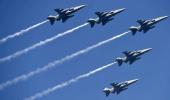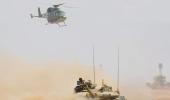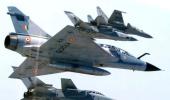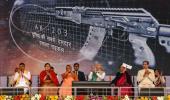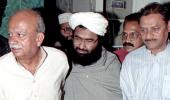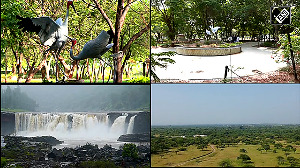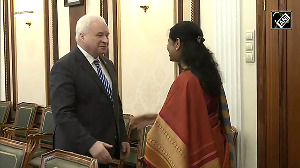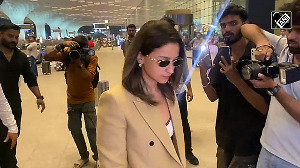'Imran cannot escape responsibility for providing a mask to the Pakistan army to engage in unlawful activities and to wage aggression after India retaliated to the terrorist attack,' says Ambassador T P Sreenivasan.
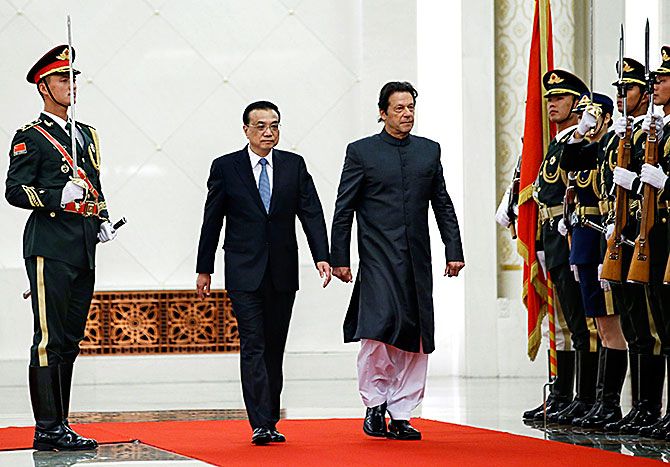
'It is just not cricket' is what would be said in English if anything unfair or unjust is done by a person, who is otherwise fair and honest, as cricket is supposedly a gentleman's game. Having to say so to a world famous captain of a leading cricketing country is paradoxical and even painful.
But that is what we have to say to Imran Khan in the aftermath of the Valentine's Day gift he presented to India this year. It was on that day that a single terrorist, trained in Pakistan, rammed into a convoy of CRPF personnel, inflicting heavy casualties.
Even if we concede that he is only the prime minister of Pakistan, who does not necessarily know all that his country does, he cannot escape the responsibility for providing a mask to the Pakistan army to engage in unlawful activities and to wage aggression after India retaliated to the terrorist attack.
There was some expectation that Imran Khan would be different from other Pakistan leaders because of his basic decency and popularity in India. But those who know how he became prime minister by securing the support of the army, the fundamentalists and terrorists will understand that he did not have much of a choice.
When he first tried to assume power as a messiah of change and peace, he did not make any headway and it was the compromise he made with the deep state in Pakistan that made him the prime minister.
Khan took over as prime minister at a time when Pakistan was facing many challenges, the most important among them being the deteriorating relations with India.
Tensions with Afghanistan, faltering relations with the US and the poor economic situation were also staring him in the face, giving him a formidable task to get Pakistan back into the fold.
'We have a very big foreign policy challenge right now. If there is one country that needs peace and stability right now, it's Pakistan,' the former cricket captain said in his victory speech after his election.
Achieving that was not likely to be easy for the first-time PM and foreign affairs novice who took the reins of a country that has been widely accused of stoking regional insecurity by backing extremists, though Pakistan had been repeatedly denying those allegations.
Ties with the US deteriorated further in January when President Donald J Trump accused Pakistan of 'lies' and 'duplicity' in the war on terror, suspending military assistance worth hundreds of millions of dollars.
Khan has repeatedly blamed Pakistan's participation in the US-led anti-terror campaign for the surge in terrorism on home soil over the last decade. But as prime minister, in a tone noticeably softer than his earlier anti-US comments, Khan has said he wants a 'balanced relationship' instead of 'fighting America's war' in exchange for aid.
Khan has begun to advocate a negotiated settlement with Islamist insurgents, a commitment that led to criticism that he is soft on terrorists and earned him the nickname 'Taliban Khan'.
It is India which remains Khan's biggest foreign policy challenge.
He cannot move an inch on the Kashmir issue as the army is dependent on it for its very existence. Terrorism is the alternative to war for them.
The entire world is aghast at the thought of a nuclear war between two nuclear-armed neighbours and therefore, war is not an option.
Reaching out to New Delhi is a path fraught with risk for civilian leaders in Pakistan, where foreign and defence policies are dominated by the powerful military.
Many analysts believe that then prime minister Nawaz Sharif's strong advocacy for better India ties earned him the wrath of the military. It also prompted vociferous criticism from Khan, who accused Sharif of trying to please India at the expense of Pakistan's interests.
For these reasons, the prediction was that India-Pakistan relations will deteriorate under Khan's watch. The present indications are that the prediction will come true.
'I was a little saddened by the way the Indian media portrayed me, as if I'm a villain in a Bollywood film,' the new PM acknowledged in his victory speech. But in an apparent about-turn after his poll victory, Khan has advocated peace as the only way forward.
'Pakistan and India must have dialogue and resolve their conflicts including Kashmir... and start trading', he tweeted once.
Moreover, given the current freeze with Washington, Pakistan's 'drift from the US camp to the China camp will continue'. Beijing has long been Islamabad's 'all-weather friend', and the strategic relationship was stepped up with the 2013 launch of the China-Pakistan Economic Corridor, a multi-billion-dollar infrastructure project that is part of Beijing's Belt and Road initiative.
The alliance is widely considered Pakistan's most important, and Khan has vowed to strengthen it further.
Imran Khan's posture after the terror attack was predictable. He stated that Pakistan would retaliate with full force if India launched an attack and did exactly that when he ordered an air attack on Indian military installations.
But given his penchant for reverse swing, he surprised everyone by readily returning Abhinandan Varthaman, with a declaration that he had done it for the sake of peace. At the same time, he continued to bombard our borders and ordered no respite to terrorism.
It would have been a great gesture if he had announced that he would stop support to terrorists on Pakistan soil as his predecessor had promised.
Khan did not get any credit for releasing Abhinandan because it was attributed to the pressure exerted on him by the US, Saudi Arabia and China.
President Trump let the cat out of the bag when he announced he was expecting some good news minutes before Khan announced the wing commander's release.
India took the position that Pakistan had no choice but to release the prisoner of war as we released 93,000 Pakistani POWs in 1972. India did not even thank the Pakistan government for Abhinandan's release. But the fact is that public opinion in India was grateful to Imran Khan for the gesture, as they had expected worse from him.
The curious thing about the episode was that a resolution was submitted to the Pakistan national assembly, recommending Imran Khan for the Nobel Peace Prize for de-escalating tension with India, even when intensified firing continued on the border.
According to the resolution, Khan 'acted responsibly' in the current tension between the two neighbouring countries and 'deserves the Nobel Peace Prize'.
A former IAS officer also joined the chorus and praised the Pakistan PM's conduct. 'Braveheart wing commander's life is worth not one but two Nobel Prizes', he tweeted.
Self-serving recommendations for the Nobel Peace Prize are common in election days. The nominees may never get the Nobel Prize, but the candidates concerned may get some extra votes!
Khan was modest enough to say that the person worthy of the award would be 'the one who solves the Kashmir dispute'.
'I am not worthy of the Nobel Peace Prize,' he said. 'The person worthy of this would be the one who solves the Kashmir dispute according to the wishes of the Kashmiri people and paves the way for peace and human development in the subcontinent.'
That sounded like the words of a cricketer.
If only he had the authority and if he was indebted to the army and the fundamentalists, Khan would have emerged as a peace maker.
But the best we can hope for is a pre-Valentine's Day situation, at least till the elections in India are over.
Ambassador T P Sreenivasan, (IFS 1967) is a former Ambassador of India and Governor for India of the IAEA. He is currently Director, NSS Academy of Civil Services and Director General, Kerala International Centre.
